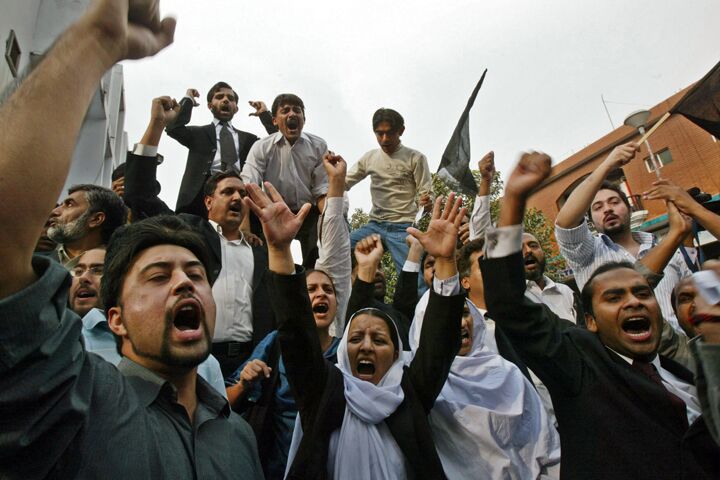
Pakistan Instability Deepens
Pakistan’s president declared a state of emergency rule and suspended the Pakistani Constitution this past Saturday. He argued that the Pakistani Supreme Court’s decision to release some 60 suspected terrorists made the fight against Islamic terrorism impossible and necessitated a state of emergency rule.
Since declaring this state of emergency, President Pervez Musharraf, who originally took control of Pakistan in a 1999 military coup, has replaced the chief justice, curtailed the media, banned public gatherings, and rounded up opposition leaders.
Because the Supreme Court was planning to contest the validity of Musharraf’s recent reelection, his critics have used his drastic actions to accuse him of using the terrorists’ release issue as a guise to remain in power after having promised to leave the military and schedule a general election.
Hundreds of protesters chanting the name of opposition leader Benazir Bhutto have flocked to the Pakistani parliament in blatant disregard of the ban on public gatherings. Police have resorted to the use of beatings and tear gas to disperse the crowds and arrest thousands.
In the midst of this chaos, leaders around the world have urged Musharraf to stop hindering the establishment of democracy in Pakistan. United States President George Bush refused to directly criticize Musharraf, who is a key ally in the war against terrorism, but did telephone him on Wednesday, urging him to retire from the military and to hold a general election as soon as possible.
The situation is extraordinarily dangerous because Pakistan is a nuclear power with a large population of Islamic extremists and those who sympathize with them. Islamist militants loyal to a radical Islamic cleric have largely taken control of Pakistan’s Swat Valley, seizing several key towns. Parliamentary troops and police opposing them have been forced to surrender their weapons.
“Indeed, polls indicate that Osama bin Laden is already more popular in Pakistan than Musharraf,” reports Germany’s Spiegel Online.
When Egypt yielded to U.S. pressure to hold a more democratic election in 2005, the outlawed Muslim Brotherhood grabbed almost 20 percent of the seats in the Egyptian parliament. With such a large population of Islamic extremists in Pakistan, democratic elections could result in an extremist shift in Pakistani politics.
Whether Musharraf is using Pakistan’s “state of emergency” as a ploy to retain power or not, chaos, protests and civil unrest are undermining the stability of one of the few states in the region Washington has considered an ally in the war on terror.
Joseph Biden, chairman of the U.S. Senate Committee on Foreign Relations, said, “The risk that Pakistan—often dubbed the ‘most dangerous country in the world’ by terrorism experts due to its explosive mix of Islamist extremists, nuclear weapons and capricious military officials—may flip-flop from being a close ally of the United States to becoming an American nightmare seems more real than ever.”
Watch as Islamic terror increases on the world scene and as America loses more and more of its allies. For more information on the role Islamic terror will play on the world scene, read The King of the South by Trumpet editor in chief Gerald Flurry.
